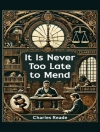Stanley John Weyman’s ‘The Long Night’ is a gripping historical novel set against the tumultuous backdrop of 16th-century France. Through its richly woven narrative, Weyman employs a vivid literary style that evokes the complexities of the period, seamlessly blending adventure and political intrigue. The novel explores themes of love, loyalty, and betrayal as characters navigate the dangers of a divided nation, reflecting the sociopolitical dynamics of the time. Weyman’s skilled storytelling invites readers into a world of treachery and heroism, making it a quintessential representation of turn-of-the-century historical fiction. Stanley John Weyman, often dubbed the ‘father of historical romance, ‘ was deeply influenced by the tensions of his own Victorian context, where the past was romanticized and the present fraught with uncertainty. Drawing on his extensive knowledge of history and literature, Weyman crafted ‘The Long Night’ during a time when the genre of historical fiction was emerging, allowing him to blend factual events with imaginative storytelling. His background in both law and writing provided him with a nuanced understanding of character motivation and ethical dilemmas, enriching the narrative. Readers seeking an enthralling journey into a bygone era will find ‘The Long Night’ a compelling addition to their literary repertoire. Weyman’s expert character development and immersive prose offer a captivating experience that sheds light on the human condition amid the harsh realities of historical warfare and romance. This novel is not just a tale of survival; it is a poignant exploration of what it means to confront darkness, making it an essential read for enthusiasts of historical fiction.
Про автора
Stanley John Weyman (1855–1928) was an English novelist sometimes referred to as the ‘Prince of Romance’. Born in Ludlow, Shropshire, England, Weyman originally pursued a career in law after his education at Shrewsbury School and Christ Church, Oxford. Despite his legal background, his true passion lay in writing, leading him to publish his first novel at the age of 35. Weyman’s works are characterized by their vivid historical settings, often focusing on periods of upheaval and transformation such as the French Renaissance and the Thirty Years’ War. He meticulously researched historical periods, which is evident in ‘The Long Night’ (1897), a novel that places readers in the heart of 16th-century France amidst religious conflict and personal drama. Weyman was a master of incorporating historical detail into compelling narrative arcs, a practice that earned him comparisons to Alexandre Dumas. While his novels have been categorized as historical romances, their engaging plots, and rich character development transcend simple genre classification. Weyman enjoyed considerable popularity in his lifetime, with a writing career that spanned over three decades and produced a multitude of novels and short stories that continue to be appreciated by aficionados of historical fiction.












